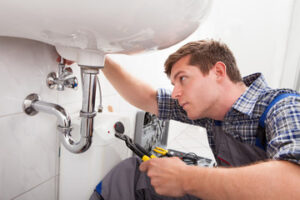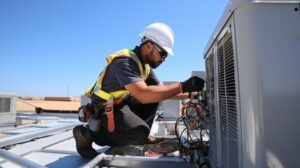Plumbers install, repair, or maintain plumbing fixtures and systems in homes, businesses, and industrial settings. Their duties include interpreting blueprints, estimating project costs, and ensuring compliance with local building codes and regulations.

Successful plumbers have strong problem-solving skills and are adept at troubleshooting. They also need to have physical stamina and be comfortable working in tight spaces.
Plumbing systems are vital to the comfort of modern life, taking away waste water and delivering freshwater into residential and commercial spaces. Plumbers install and repair these systems, maintaining them to ensure they are functioning properly. They also work with a variety of materials and must possess a strong understanding of building codes to correctly install pipes, fixtures, and appliances. Plumbers also need excellent problem-solving skills to resolve issues quickly and effectively.
Licensed plumbers have completed an apprenticeship program or hold a tradesman’s certificate. They are familiar with the wide range of plumbing tasks, including repairing leaks, installing new pipes and taps, and power flushing central heating systems. They can also assist with more complex plumbing installations, such as gas line upgrades and drainage system changes.
Construction plumbers specialize in new plumbing system installations. They collaborate with architects, engineers, and construction teams to plan and execute plumbing projects for new buildings and structures. They read blueprints to understand the dimensions and specifications of pipe systems, and then lay them out according to code. They may also install specific fixtures and appliances, such as toilets, faucets, and sinks.
Industrial plumbers are trained to work with large-scale piping and waste systems in factories and other industrial settings. They use specialized tools and equipment to maintain these large-scale systems, and are responsible for ensuring that they meet building codes and safety protocols.
Service and repair plumbers respond to calls from home and business owners to address plumbing emergencies. These can include clogged drains, broken toilets, and leaking pipes. They use their knowledge of plumbing systems to diagnose problems and repair them, often using specialized tools to clear blockages in sewer pipes. They may also upgrade older systems to improve their efficiency, or replace them entirely.
Soft skills are important for plumbers to have, as they often interact with customers on a regular basis. They need to be polite and friendly, and explain what steps they’re taking to fix a problem. They also need to be comfortable working in tight spaces and spending long periods of time on their feet.
Repair
Plumbing repair services are offered to address issues that arise from time to time. Some of the most common repairs include fixing leaky faucets, clogged drains, and water heater problems. Plumbers have the tools and skills to diagnose and fix these issues quickly and efficiently. In addition to fixing existing fixtures, these professionals can also install new ones if the old ones are outdated or damaged beyond repair.
Another important service that plumbers offer is sewer line repair and replacement. A broken sewer line can cause significant damage to a home, so it’s crucial to have this issue fixed immediately. Plumbers can use video inspections to identify the source of the problem and recommend the best course of action.
Leak detection and repair is another service that plumbers provide. Hidden leaks in pipes can lead to extensive water damage and high utility bills. Plumbers use special equipment to detect and repair these leaks without damaging the surrounding area.
Plumbers can also help homeowners improve the quality of their water by installing and repairing water filters. Filters help remove harmful substances from the water, such as lead and chlorine. In some cases, plumbers may need to adjust the filter’s settings or replace it altogether.
Plumbing systems can be complex, so it’s important to have a professional plumber inspect and maintain them regularly. This ensures that all components are working properly and minimizes the risk of future problems. In addition, a plumber can advise homeowners on how to prevent plumbing issues, such as by installing energy-efficient appliances and taking care not to flush non-biodegradable items down the toilet.
Licensed plumbers have the training and experience to perform a wide range of plumbing tasks, from replacing toilets to re-piping entire homes. They can also design plumbing for remodels, additions, and new construction projects. Whether it’s an emergency repair or a routine checkup, these professionals can get the job done right the first time. They are also knowledgeable about local building codes and regulations. In addition, plumbers who specialize in backflow prevention can protect drinking water supplies by testing and certifying backflow devices.
Maintenance
The plumbing system in a home or business takes away waste water, supplies freshwater, and regulates indoor climate through pipes, valves, fixtures, and other appliances. Plumbers install and repair these systems to ensure they work properly and safely. They may also inspect and test existing pipes to identify problems and potential violations of building codes.
Some plumbers specialize in kitchen and bathroom remodeling projects, which can include tearing down walls to upgrade wiring or add new fixtures. This requires them to have skills with power and hand tools as well as knowledge of design principles to create aesthetically pleasing and functional rooms.
Other plumbers focus on maintaining large commercial and industrial plumbing systems, which are more complex than their residential counterparts. These plumbers typically work in office buildings, restaurants, hospitals, factories, and other large facilities. They may oversee multiple piping systems that serve hundreds of occupants each day. In addition to testing and repairing water supply lines, these plumbers are often responsible for installing and repairing backflow preventers, steam traps, and other devices used to protect potable water against contamination.
When a plumbing problem arises, service and repair plumbers diagnose the issue and take immediate action. They use specialized equipment like video cameras and pressure gauges to inspect pipes, identify problems, and determine the best course of action. They also perform routine maintenance on sewage systems and water heaters to keep them functioning at peak efficiency.
Because plumbing can involve working with hazardous materials, it’s important for plumbers to follow all safety guidelines when handling them. This includes wearing protective clothing and using appropriate safety gear for each job. They must also be comfortable working in tight spaces and spending long periods of time on their feet. In addition, plumbing is a physically demanding career that can require significant physical stamina and strength as well as dexterity to maneuver tools and parts.
Customer Service
In an industry where reliability, trust and quality service are paramount, plumbers can set themselves apart from the competition by prioritizing customer satisfaction. This can be achieved through seamless communication and a positive experience that builds loyalty. In addition, a high-quality customer service program can lead to a strong reputation and increase new business opportunities.
Plumbing customers are often looking for a trusted expert to repair their leaky faucet or drain clog, so customer service plays a crucial role in earning and maintaining client confidence. To deliver exceptional customer service, plumbing companies need to be available when their customers need them and provide clear communication about prices, services and scheduling.
Customer-centric practices, such as knowing and addressing each customer by name and remembering past service details, are key to building rapport with customers and ensuring their needs are met. To support these best practices, a plumbing customer relationship management (CRM) software solution can help managers monitor, record and analyze customer conversations across multiple channels in one place.
Another way to improve customer service is by offering a flexible and convenient booking process that makes it easy for customers to schedule an appointment. A 24/7 online booking portal, for example, allows customers to find a time that works best for them and provides an opportunity for plumbing businesses to promote their availability on digital channels. Alternatively, offering a call-back feature that automatically reschedules appointments is another effective way to streamline the booking process and boost customer satisfaction.
Once a plumbing job is completed, it’s important for plumbing contractors to follow up with customers to ask if they are happy with the results and to ensure any issues have been addressed. This not only shows that the business cares about customer satisfaction, but it can also help to uncover any potential problems before they become major issues that require more expensive repairs.
Another way to build customer loyalty is by offering referral incentives, such as discounts and free services. This not only rewards loyal customers but also encourages them to share their experiences with others, which can ultimately drive more business for the plumbing company.
